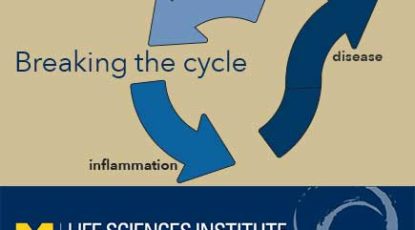Research News
-
Do mind games net brain gains?
Websites like Lumosity and PositScience promise improved brain fitness through game-like exercises. Researchers ask: Does that fitness transfer to real life?
-
Breaking the cycle of obesity, inflammation, disease
New findings bode well for U-M clinical trials on a drug that could reverse obesity, Type 2 diabetes, and fatty liver disease.
-
A mother's warmth is little comfort to a spanked child
A mother’s affection after she spanks her child does little to diminish the negative impact of the act, a new U-M study finds.
-
The future is now
U-M researchers are teaching cars, roads, traffic lights, and other roadside devices to talk to each other. Their conversations just might make driving easy, save lives, and generally improve road conditions. Connected vehicles will inform each other out about such things as traffic tie-ups, icy roads, disabled vehicles, and lane closures. And drivers will Read more
-
Stem cell research at U-M: A five-year progress report
Five years ago this month, Michigan voters opened the door for a full range of stem cell research in the state. Today, that effort is well under way at U-M, and yielding results that are expanding knowledge of a wide range of diseases.
-
Susan Murphy nets MacArthur Fellowship
This innovative professor is developing smart-phone apps and other technologies to personalize treatment for depression, addiction, cardiovascular disease, and more.
-
Inducing, augmenting labor may be associated with autism risk
Pregnant women whose labors are induced or augmented may have an increased risk of bearing children with autism, especially if the baby is male, according to a large, retrospective analysis by researchers at U-M and Duke Medicine.
-
"We may be able to watch dark energy turn on"
Video: U-M is involved in unprecedented sky survey that seeks to know why the expansion of the universe is accelerating. Discover how an international team of scientists is making a time lapse—of the last 8 billion years.
-
Gunning for trouble
They’re young. They’ve been injured in an assault. They’ve landed in the ER. And nearly one in four of them has a gun. What happens next?









